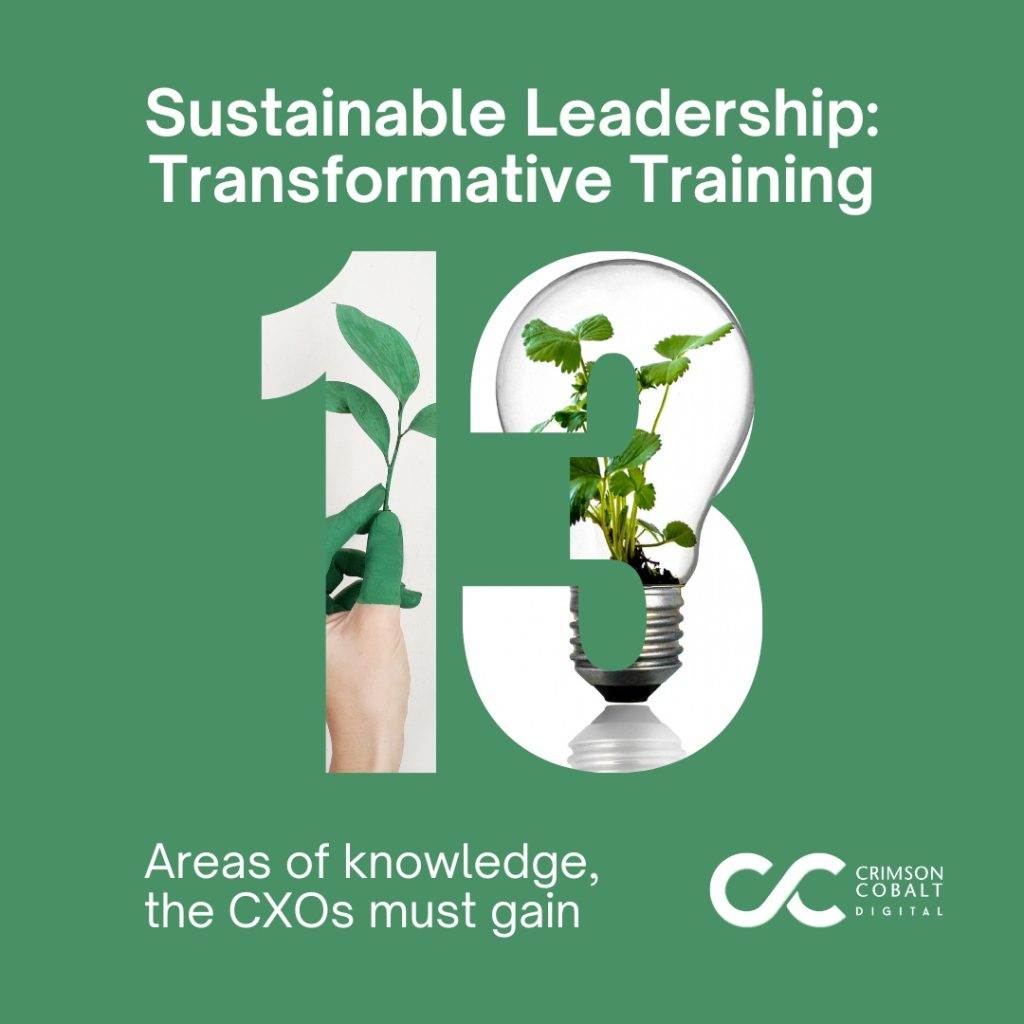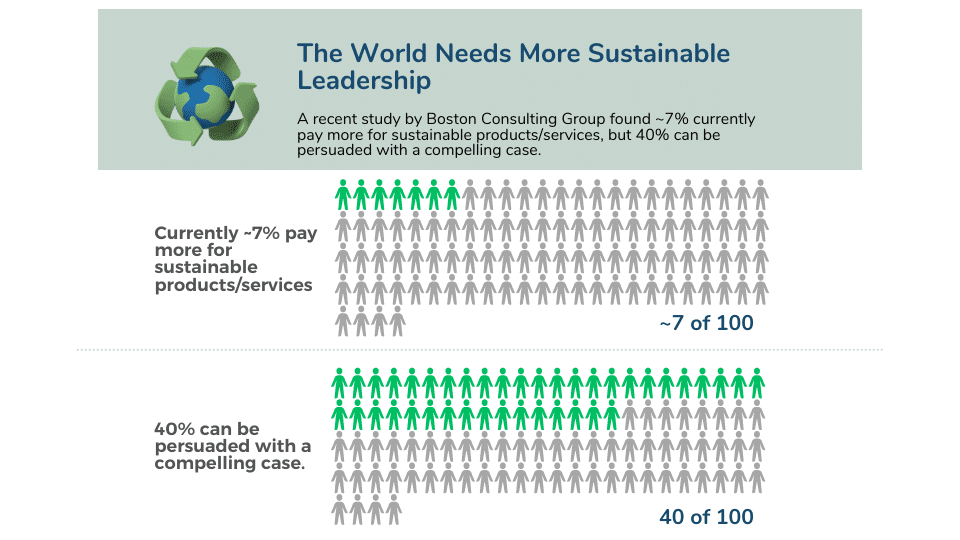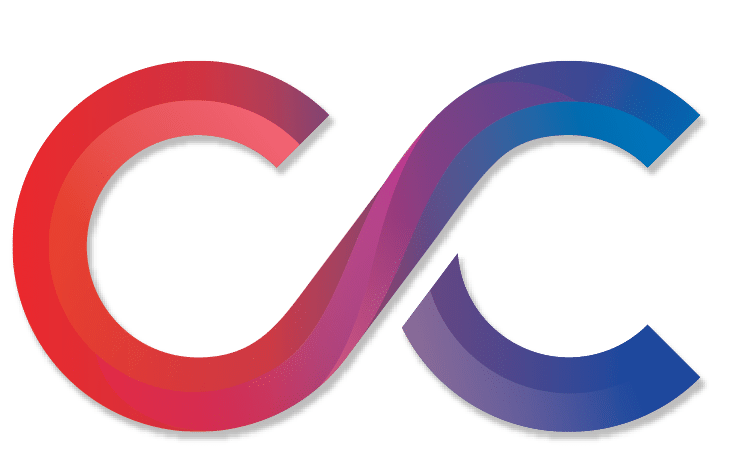Why should a CXO embrace the power of transitioning toward sustainable leadership?
Today, the need for responsible leaders who can navigate sustainability challenges and implement sustainable leadership practices is more critical than ever, as they must equip themselves with the knowledge, skills, and mindset required to drive positive change. The first step is creating your own sustainable leadership definition.
- Embracing the Mindset of Sustainability: Leaders must first embrace the sustainability mindset, understanding its significance and long-term impact. This involves recognizing the interconnectedness of environmental, social, and economic factors and the need to balance them for sustainable success.
- Building Sustainability Literacy: To venture into this field, the leaders need to develop a strong foundation in sustainability principles and practices. This includes gaining knowledge about climate change, resource conservation, social justice, ethical business practices, and sustainable development goals. A good starting point in developing sustainable leadership is to understand the United Nations Sustainable Development Goals (UNSDGs). Training programs, workshops, and online courses can provide the necessary background.
- Developing Systems Thinking: CXOs must cultivate systems thinking, which involves understanding the complex interactions between various stakeholders, processes, and impacts within an organization and its broader ecosystem. This perspective allows leaders to identify leverage points for positive change and develop holistic sustainability strategies.
- Nurturing Collaborative Leadership: Sustainability challenges require collaborative approaches. Sustainable leadership empowers CXOs in building partnerships, engaging stakeholders, and fostering a culture of collaboration and innovation. This involves breaking down silos, promoting inclusivity, and seeking diverse perspectives.
“Sustainable leadership is not merely about driving profit and growth, but about cultivating a future where economic prosperity, social well-being, and environmental stewardship coexist harmoniously.”
- Practicing Ethical Decision-Making: Responsible leaders prioritize ethical decision-making, considering the environmental and social implications of their choices. Training programs focused on creating a large pool of sustainable leadership help develop frameworks for ethical reasoning, enhance their moral compass, and navigate complex dilemmas in a sustainable and responsible manner.
- Driving Change and Innovation: Leaders must be catalysts for change within their organizations. Training can equip leaders with tools and strategies to drive sustainability initiatives, foster innovation, and embed sustainable practices into core business processes. This includes setting ambitious sustainability goals, implementing sustainable technologies, and measuring and reporting progress.
- Leading by Example: Leaders have a powerful influence on organizational culture and employee behavior. By embodying sustainability values, demonstrating personal commitment, communicating effectively, and setting sustainable leadership examples, they inspire others to follow suit. Leading by example creates a ripple effect throughout the organization and encourages others to embrace sustainability.
The age of sustainability demands responsible leaders who can navigate complex challenges and lead their organizations toward a more sustainable future.
Leaders can gain the knowledge, skills, and mindset necessary to drive positive change by investing in training and development opportunities.
Strategy Courses
- Sustainable Business Strategy: You can gain insights into sustainable leadership by integrating sustainability into core business strategies, identifying opportunities, and mitigating risks.
- Ethical Leadership and Corporate Governance: You can take a gigantic leap in governance with education on ethical decision-making, fostering a culture of integrity, and implementing responsible governance practices.
- Climate Change and Resilience: Sustainable leadership needs not only the understanding of climate science and adaptation strategies but also the mitigation measures to navigate the challenges of climate change.
- Carbon Management: Carbon footprint and carbon trading are often used, but you need a deeper understanding of the ecosystem to integrate them into your strategies. Sustainable leadership requires a thorough knowledge of comprehensive carbon management plans to mitigate climate change impacts. Leaders can acquire an understanding of carbon footprint measurement, reduction strategies, and carbon offsetting mechanisms.

These sustainable leadership courses provide CXOs with the knowledge, skills, and tools necessary to navigate the complexities of sustainability, drive positive change, and lead their organizations toward a more sustainable future.
Leaders can become catalysts for sustainable transformation through sustainability literacy, systems thinking, collaborative leadership, ethical decision-making, driving innovation, and leading by example.
Sustainable Transformational Practices
- Social Impact and Stakeholder Engagement: Leaders can understand ways to engage stakeholders effectively, address social challenges, and create shared value within communities.
- Diversity, Equity, and Inclusion (DEI): With an understanding of the importance of DEI in organizations, you can develop inclusive leadership skills and create equitable workplaces.
- Environmental Management: Learn strategies to reduce environmental impact, manage resources efficiently, and implement sustainable practices.

Sustainable Products and Supply Chain
- Sustainable Supply Chain Management: Explore responsible sourcing, ethical procurement, and supply chain optimization for sustainable operations.
- Sustainable Product Development involves creating products that minimize negative environmental and social impacts throughout their lifecycle. It integrates sustainability principles into all stages, from design and sourcing to manufacturing, distribution, and end-of-life disposal. Courses on sustainable product development provide valuable insights into designing and creating products with minimal environmental and social impacts.
- Circular Economy and Waste Management: You can discover ways to transition from a linear economy to a circular model, minimize waste, and promote resource efficiency.
Functional Understanding
- Carbon Management: Carbon footprint and carbon trading are often used, but you need a deeper understanding of the ecosystem to integrate them into your strategies. Sustainable leadership requires a thorough knowledge of comprehensive carbon management plans to mitigate climate change impacts. Leaders can acquire an understanding of carbon footprint measurement, reduction strategies, and carbon offsetting mechanisms.
- Sustainable Finance and Impact Investing: Leaders often benefit from a deeper understanding of sustainable investment practices, green finance opportunities, and aligning financial decisions with environmental and social considerations.
- Sustainability Communications: Effective communication is a step toward becoming a responsible brand. Leaders can develop skills to effectively communicate sustainability initiatives, engage stakeholders, and convey the value of sustainable practices to internal and external audiences.
By applying their newfound knowledge, CXOs can transform their organizations, making sustainability an integral part of their decision-making and operations.

From sustainable business strategies to social impact, supply chain sustainability, resilience, circular economy, carbon management, sustainable product development, impact finance, diversity, equity, and inclusion (DEI), and reporting, these courses empower leaders to drive positive change.
By becoming a sustainable leader, CXOs contribute to a more sustainable future for society and the planet.
The top sustainability frameworks that leaders can understand and follow include
- United Nations Sustainable Development Goals (SDGs): A set of 17 goals that outline global sustainability priorities, offering a framework for businesses to align their strategies and actions with the broader sustainable development agenda.
- Global Reporting Initiative (GRI): A widely recognized framework for sustainability reporting, providing guidelines for organizations to measure and disclose their environmental, social, and governance (ESG) performance.
- Task Force on Climate-related Financial Disclosures (TCFD): Provides recommendations for companies to disclose risks and opportunities, helping leaders assess and manage climate-related impacts on their operations, finances, and strategies.
- Carbon Disclosure Project (CDP): Provides a platform for organizations to measure and disclose their carbon emissions and climate-related data, supporting leaders in understanding and managing their carbon footprint.
- Sustainability Accounting Standards Board (SASB): Offers industry-specific sustainability standards, enabling leaders to identify and report on financially material ESG factors that impact their industry’s performance.
- ISO 14001: A globally recognized standard for environmental management systems, assisting leaders in implementing effective environmental management practices and achieving environmental sustainability goals.
- The Natural Step Framework: A science-based framework that helps leaders understand and navigate sustainability challenges by providing a holistic approach and guiding principles for sustainable decision-making.
- Equator Principles: Principles for assessing and managing environmental and social risk in project financing, promoting sustainable and responsible practices in the financial industry.
Transform your leadership and amplify sustainability communication with CrimsonCobalt Digital. Leap driving positive change.

Reach out today! #LeadershipTransformation #SustainabilityCommunication
